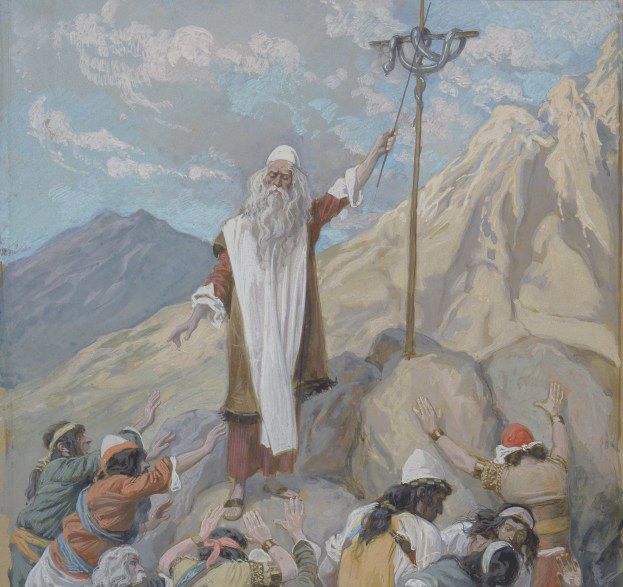Remember the story of the brazen serpent in the Old Testament?
You can read it in Numbers 21:4–9, but here’s a little synopsis:
Moses was leading the Israelites through the wilderness, and they were discouraged because of the journey. They complained about God and Moses. So, God sent fiery serpents among them. Anyone who got a poisonous snake bite became sick and died.
The Israelites confessed their sin and repented. They asked Moses to pray for God to remove the serpents. God commanded Moses to make a serpent of brass and set it up on a pole. Anyone with a snake bite who looked—simply looked—at the serpent would be healed.
Moses did as God commanded, and everything happened just as God said it would.
Now, for my Super-Advanced Trivia Question of the Day: Whatever happened to that brazen serpent that Moses made?
It shows up again later in the Old Testament.
Remember where?
Flip your Bible open to 2 Kings 18:1–4, and we are now in the reign of King Hezekiah over Judah.
Hezekiah was a good king who did what was right in God’s sight.
“He removed the high places, and brake the images, and cut down the groves, and brake in pieces the brasen serpent that Moses had made: for unto those days the children of Israel did burn incense to it: and he called it Nehushtan.” (2 Kings 18:4)
Hezekiah went on a righteous rampage, getting rid of all the idol worship that was going on in complete disobedience to the second commandment. He even destroyed the brazen serpent because the people were worshipping it like an idol.
We aren’t specifically told why and how the people started worshipping the ancient object, but we can infer what likely happened. The people forgot that the brazen serpent was merely a symbol of God’s mercy and power. They began, perhaps, to believe that the object itself had the ability to heal the sick. They began giving it offerings of incense that were most definitely NOT in the Law of Moses.
The word “Nehushtan” means simply “brazen thing,” according to Easton’s Bible Dictionary. It was used for an incredibly miraculous purpose at a specific time in history, but it didn’t have any power of its own.
Why are we humans so inclined to worship objects? Why do we give them significance way beyond their due? After a while, our cherished possessions can seem larger than life, and we have a tendency to become quasi-superstitious about them.
Objects can have sentimental value, but they don’t hold any spiritual power. God is the only one with spiritual power. He’s the only one we can ask for help. He’s the only one we can worship in spirit and in truth.
These days, we don’t really prostrate ourselves before physical objects—or burn incense to them. These rituals have been largely relegated to the past in the developed world.
…right?…
I’m going to do a tiny personal reflection right now. I’m going to consider my phone. Do I obey my phone’s commands? Do I make that phone a priority? Do I offer it more time and consideration and care than it deserves? Do I feel lost without it? Am I idolizing this object because I’m kinda fond of it and I have been for about a decade now?
It’s just a phone—a fancy combo of plastic and glass and metal. But I can tell you that I’m not careless or nonchalant with mine. Phones these days are incredible—they’re like tiny handheld miracles. And they’re easy to worship (unnervingly so).
Let’s not fall into the same trap as the people of Judah. Let’s not take an object—no matter how sentimental, nostalgic, or powerful—and give it more than its due.
God used the brazen serpent, no doubt. God does use objects for His good purposes today—handkerchiefs, olive oil, bread, wine, and water, to name a few—but nothing has any true power apart from Him.
Let’s not forget that God is WAY too powerful to be contained in or depicted by anything inanimate. Even though we can’t see Him face to face in this mortal coil, He asks us to have faith in His total and complete reality and sovereignty. When we set aside objects made of wood and stone and even plastic and pixels, we free our hearts from idol worship, and we can then begin to embrace our Creator.
Worshipping Him is what we’re created to do, and it’s the only kind of worship that results in true connection and real results.
So, let’s be like Hezekiah. Let’s have the courage to break in pieces the longstanding idols in our lives.
Image credit: The Brazen Serpent (watercolor circa 1896–1902 by James Tissot)
This article has undergone ministry review and approval.





0 Comments